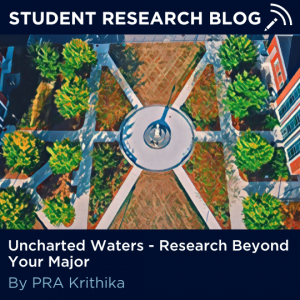By Krithika Santhanam, Peer Research Ambassador
 If you’ve read my bio, you know that I am a pre-medical student studying Molecular and Cell Biology. This part of my UConn story aligns with my described research experience: an undergraduate research assistant in Dr. Caroline Dealy’s laboratory at UConn Health and co-president of UConn Pre-Medical Society. However, my UConn journey does not end there.
If you’ve read my bio, you know that I am a pre-medical student studying Molecular and Cell Biology. This part of my UConn story aligns with my described research experience: an undergraduate research assistant in Dr. Caroline Dealy’s laboratory at UConn Health and co-president of UConn Pre-Medical Society. However, my UConn journey does not end there.
After being in a STEM laboratory for 2 years, I decided to swim into uncharted waters and pursue non-STEM research, something your typical pre-medical student might not do. I also have an individualized major in Health Policy and Racial Disparities which provoked my current research exploring the experiences of individuals with disabilities in South India through UConn’s BOLD Women’s Leadership Network and a preventative screening volunteer for UConn Health Leaders.
How did I get here, and more importantly, why did I step outside the typical pre-med path?
My freshman year, I decided to get involved in research because it was something I saw high-achieving individuals pursuing around me. I thought If I could get into research, it would mean I could be successful and high achieving. Although my initial intent for pursuing research may be flawed, my experience was raw and unique. I actively sought out and fell in love with my current position in Dr. Caroline Dealy’s Laboratory and began to learn numerous transferable skills. Her lab environment was the perfect place for me to grow.
Second semester freshman year, I learned about the individualized major program and decided to enroll in the class about interdisciplinary studies. It was during this class I learned that there even was social science and humanities research on campus. However, the people who talked about this type of research were sociology, English, and anthropology majors. So, I concluded that it was not an environment I should enter because my background was science. As a pre-medical student, all other pre-meds were conducting basic lab bench, translational, and clinical research, so I knew that I had found my home and should probably stick with it.
The summer between freshman and sophomore year I was given the opportunity to sit in on a TIP Fellow Seminar panel with current PhD students. It was during this seminar I heard the raw experience of an individual who said “I wouldn’t have figured out my path if I didn’t explore everything I possibly could have with research”. Their words stuck with me and gave me a new outlook on pursuing research. Being a pre-health professions or STEM student does not exclude you from social science and humanities research. Likewise, being a humanities or social science student does not exclude you from STEM research. Pursue your passions, they do not have to align with your major. You don’t have to craft a perfect story with your experiences, the story will be made as you go.
I knew this outlook was not prominent amongst my peers. I advocated this perspective through my solo facilitation as an FYE mentor sophomore year and continue to advocate this perspective in my current position as a Peer Research Ambassador. This perspective ultimately influenced my BOLD project, which focuses on a topic I hold dearly to my heart. Although I have currently taken a step back from the Dealy lab to plan and conduct my BOLD project, the skills I learned there are tremendously valuable and will continue to aid my career path.
Two weeks ago, Pre-Medical Society hosted an undergraduate researcher panel that consisted solely of non-pre-medical students, which has never been done before. The new direction, or the face of research, that is presented to members is inclusive of all disciplines. I hope that by reading this blogpost, and by implementing more events like this, you will also realize that your storyline is not meticulously generated, but actively conducted. In research terms, there is no one right type of research, and no graduate program is expecting you to do one specific thing. Take your time, learn, explore, engage, and don’t make the mistake I made of narrowing my perspective to the storylines of others. Make your own.
Krithika is a junior double majoring in Molecular & Cell Biology and Health Policy and Racial Disparities (IMJR). Click here to learn more about Krithika.